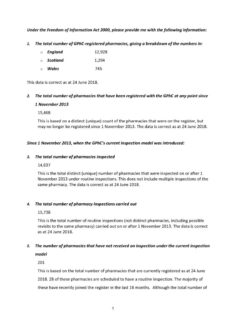
Its definition of a ‘poor’ pharmacy is one where:
- There are “major concerns about patient safety… that require immediate improvement”
- The pharmacy is “likely to present an unacceptable risk of harm to patients and the public. This means the risk is likely to occur and/or will have moderate to high impact.”
The findings also reveal that despite its current inspection model starting nearly five years ago, the GPhC has not yet inspected all pharmacies in Great Britain, meaning risks to patient safety could potentially go undetected for a significantly long time.
This information was found through a Freedom of Information (FOI) request sent to the GPhC on 30th May 2018 and covers between the 1st November 2013 and 24th June 2018. A previous FOI response in November 2017 also showed that since it was established in 2010, the GPhC had never issued a single sanction against a pharmacy owner or superintendent for a breach of its pharmacy premises safety standards.
“We were prompted to submit the FOI when considering our response to the GPhC’s current consultation on changes to its approach to regulating registered pharmacies,” said Alima Batchelor, Head of Policy at the PDA. “It became apparent that some information about the GPhC’s approach to inspections was not in the consultation document and did not appear to be in the public domain. The standards in registered pharmacies can have an impact on many patients through the working conditions they create. Certainly, many of our members have reported poor working conditions and we’ve been campaigning for some time for improvements to the regulation of registered pharmacies.”
Instead of sanctions, superintendents/pharmacy owners are asked to submit an action plan to the GPhC for each premises standard not met. ‘Poor’ pharmacies are asked to do this within 10 working days, and ‘satisfactory’ pharmacies within 20 working days.
The GPhC’s policy is to revisit ‘poor’ pharmacies to check that issues have been addressed. During the follow-up visit, if sufficient standards are still not met, the action plan remains outstanding for a further 1-3 months while the pharmacy continues to operate despite the potential risks to patient safety.
If on a further follow-up visit standards are still not met, the inspection is closed as ‘poor’ and another inspection scheduled within 6 months. It is then not clear what action is taken but no sanctions have been issued. Alternatively, after the further follow-up visit the GPhC can impose conditions on the pharmacy where the registrar considers it necessary ‘to secure the safe and effective practice of pharmacy’; we are waiting to hear from the GPhC on how many times this has been done.
However, if a satisfactory pharmacy fails to complete the action plan, the GPhC contacts the pharmacy owner to explain the importance of the action plan, makes a note of it, closes the inspection and no further follow-up activity is undertaken.
Although the GPhC have identified these patient safety risks, we have still seen no evidence of any sanctions against pharmacy owners or superintendents for breaching its pharmacy standards.
The GPhC’s treatment of pharmacy owners is in stark contract with their treatment of individual registrants. Since its inception in 2010, the GPhC has issued 4,111 sanctions to individual registrants.
Alima continued: “The findings from this FOI response are clearly worrying. Can these problems ALWAYS be the fault of individuals working on the front line, and NEVER the fault of the organisation, or because of the policy set by the employer?
The GPhC has previously said it should be a “peripheral player” in tackling workplace pressure, but we do not agree; pharmacy premises standards and workplace pressure are inextricably linked. We’d like to see the GPhC take a stronger, more modern “systems” approach to patient safety, as used in other industries, to protect the public. That includes significantly strengthening its approach to regulating registered pharmacies – and whilst we’re generally supportive of the proposals in its current consultation, they do not go nearly far enough.”
